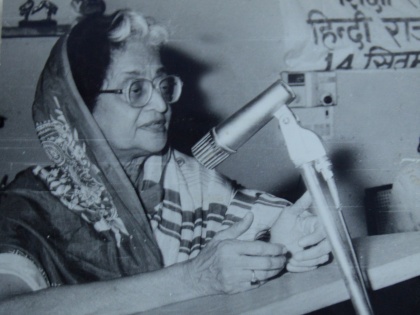Incredible Journey of Rajputana’s Daughter Lakshmi Kumari Chudawat from Purdah to People
By Anubha Jain | Published: August 11, 2022 01:49 PM2022-08-11T13:49:29+5:302022-08-11T13:50:45+5:30
Rani of Rawatsar, Lakshmi Kumari Chudawat is a renowned name in the sphere of Rajasthani scholars and politicians. Elected ...

Incredible Journey of Rajputana’s Daughter Lakshmi Kumari Chudawat from Purdah to People
Rani of Rawatsar, Lakshmi Kumari Chudawat is a renowned name in the sphere of Rajasthani scholars and politicians. Elected to Rajya Sabha and member of Upper House from 1972 to 1978 and also a member of 3rd, 4th, and 7th Rajasthan Legislative Assemblies from Bhim, Deogarh on Congress ticket in 1962, 1967, and 1980 Chudawat was among the first women politicians in Rajasthan who strived hard to make Rajasthani an official language and contributed significantly to Rajasthani literature.She was known for abandoning the "purdah" (veil system) in the feudal era and spent her entire life for women’s upliftment, especially through her writing. Well-known writer and poet, Chudawat was honored with the prestigious Padmashri Award in the year 1984 for writing the Mahagatha of Devnarayan Bagdawat, an Idol of Gurjar Community.
Dynamic Chudawat was a forward-looking yet great follower of Rajasthani rituals & traditions. In traditional Rajputi attire when Chudawat went to receive the Padmashri Award at Rashtrapati Bhawan in New Delhi, Indira Gandhi hugged her adorably and told her, “Lakshmi, your fondness for tradition and culture would surely help you attain your goals.” It was Chudawat’s efforts that saw the establishment of the Rajasthani language in the mainstream educational, literary, and media circles, and a proposal was initiated to make Rajasthani an official language in the Rajasthan State Assembly though it did not materialize. Similarly, Bikaner Rajasthan Academy was established, the Rajasthani language got placed in the Central Literature Academy, the Rajasthani language was introduced in schools and Universities’ course curriculum and Rajasthani programs were started on All India Radio and Television.With progressive beliefs and familiarity with Rajasthani literary folklore, Chudawat, without any formal education, has written 37 books of short stories and poems in Rajasthani and Hindi. Her writing includes essays like Rajasthan ki Rajniti mein Mahilayein, Rampyaari ki Risala, and story books like Gir Uncha, Uncha Ghar, Manjhal Raat, and many more. She has also written the English version of Momal, the love story of the desert princess. Chudawat also translated the biography of Lenin into the Rajasthani language.
For translations of Russian stories in the Rajasthani language and compiling them in book form, titled Hindu Kush ke us paar, Chudawat received the coveted Soviet Land Nehru Award in 1965. Impressed with Chudawat's writing acumen, French writer Frances Taft wrote a book on her by the name ‘From Purdah to the People’. She was conferred with Rajasthan Ratna Award in the year 2012.Conferred with numerous awards like Sahitya Mahamahopadhyay, Rajasthan Ratna in 2012, Tessitory Gold Award, Maharana Kumbha Award, and the Soviet Land Nehru Award in 1965, Chudawat was born in 1916 and raised in Bhim, Deogarh, a premier thikaana or estate of the then Mewar State.Chudawat till the age of 13 used to wear a turban and pant shirt like a tomboy. Adorably, her father called her Laxman Singh. Her father Shri Vijay Singh, the Rawat of Deogarh, nurtured Chudawat in a moderate liberal environment but also imbibed her with moral values. During that era, girls were restricted from going out and studying. Hence, eminent tutors were appointed to teach her. She was also taught horse riding along with her brother. She learned to type on a typewriter and managed to type her stories, poems effortlessly. She was a football and badminton player and a shooter.Chudawat was married to Rawat Tej Singh, the Chief of Rawatsar, one of the four chiefs of the then Bikaner state, and became Rani of Rawatsar. With encouragement from her husband and parents, Chudawat entered active politics in 1962. She discarded the surname of her husband ‘Rathore’ and used the clan name of her parents, ‘Chudawat’.Chudawat and Rajmata Gayatri Devi entered public life together in 1962. While Gayatri Devi founded the Swatantra Party, Chudawat became a legislator from her maternal place Deogarh, which is now in Rajsamand District. After joining politics, Chudawat did tremendous work for Bhim and Rawatsar.
In 1980, she returned to the state political scenario and was elected as MLA with a margin of 3,366 votes. However, disappointed with the reduced voting margin, Chudawat declared that she would not contest any more elections and eventually she left politics in 1985.Visited the World Peace Conference in Hiroshima, Japan in 1958, Chudawat as an Indian representative, read a paper on Rajasthan’s culture at Chicago University. She participated in Tashkent’s Afro Asian Writers Conference with a United Nations Organisation Conference held in 1978 in New york. From 1976 to 2014, Chudawat also worked as the President of the Rajasthan Progressive Writers' Association.Chudawat died in 2014, aged 98, but she will always remain in the hearts of the people of Rajasthan owing to her incredible involvement with and devotion to the Rajasthani language and literature and as a voice of rural women.